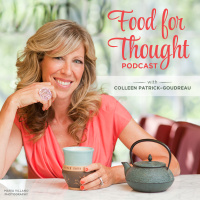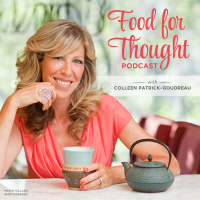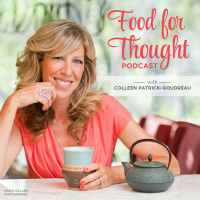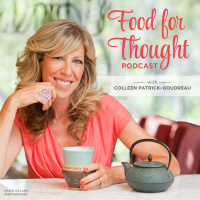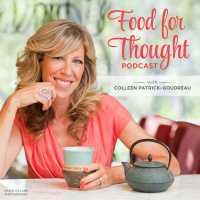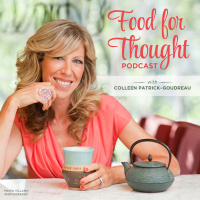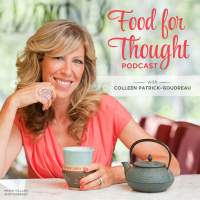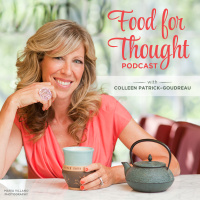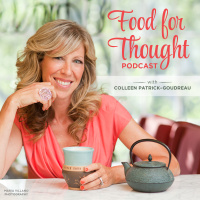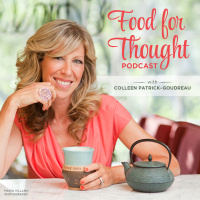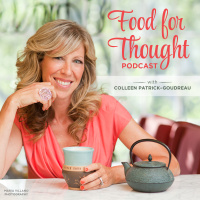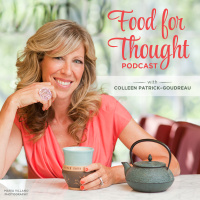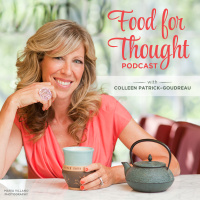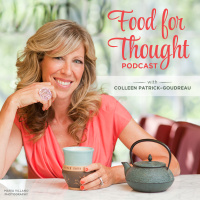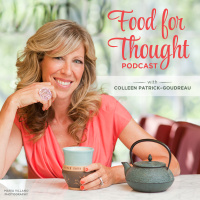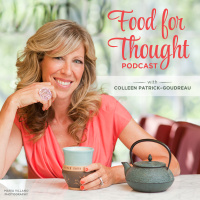Sinopse
Emphasizing the fact that being vegan is a means rather than an end in itself, the Food for Thought podcast addresses all aspects of eating and living compassionately and healthfully. Each episode addresses commonly asked questions about being vegan, including those regarding animal protection, food, cooking, eating, and nutrition — and debunks the myths surrounding these issues. Hosted by bestselling author Colleen Patrick-Goudreau, Food for Thought has been changing lives for over a dozen years. Learn more at ColleenPatrickGoudreau.com.
Episódios
-
Mutilation: An Ugly Word, An Ugly Act
02/02/2007 Duração: 24minThe root of the word mutilate means "to cut up, to cut off," and that’s what we do systematically to billions of animals — because we can. Join host Colleen Patrick-Goudreau as she explores yet another truth — disturbing though it is — about our treatment of non-human animals. —————— Join our awesome community and support this podcast through Patreon or as an Apple Subscriber for bonus material, early access to episodes, and other perks, depending on the option you choose. Support this podcast today at JoyfulVegan.com/Donate Visit my website: JoyfulVegan.com Join me on an all-inclusive vegan trip: JoyfulVeganTrips.com AFFILIATE PARTNERS: Nama Juicer — Use this link and coupon code COLLEEN10 and get 10% off my favorite juicer. Plaine Products — Use this link and coupon code "compassion" for 15% off my favorite zero waste bath and body products. Complement — Use this link and coupon code "joyfulvegan" and get 10% off my favorite supplements. Thank you for listening. This is a public episode. If you'd lik
-
Iron: An Essential Mineral
25/01/2007 Duração: 24minIron deficiency is the most common nutrient deficiency in the U.S. and worldwide. The groups that are most susceptible are women who menstruate, pregnant and lactating women, teenagers, and children aged 6 months to 4 years. This is true for vegans and non-vegans / non-vegetarians. In this episode, host Colleen Patrick-Goudreau debunks myths about iron, names some iron-rich plant-based foods, explains why overconsumption of iron is a cause for concern, and suggests we give our blood away! Tune in for tips and resources on making healthful, compassionate choices. —————— Join our awesome community and support this podcast through Patreon or as an Apple Subscriber for bonus material, early access to episodes, and other perks, depending on the option you choose. Support this podcast today at JoyfulVegan.com/Donate Visit my website: JoyfulVegan.com Join me on an all-inclusive vegan trip: JoyfulVeganTrips.com AFFILIATE PARTNERS: Nama Juicer — Use this link and coupon code COLLEEN10 and get 10% off my favorite jui
-
Minding the Gatekeepers: Meat is Not Neutral
20/01/2007 Duração: 24minI'm always struck by the notion that to be vegan is to take a position, the implication being that to eat meat is to be neutral. Mainstream media outlets tend to be reluctant to appear to bias toward veganism but seem to be unaware that they're revealing their meat-eating bias when they promote meat. —————— Join our awesome community and support this podcast through Patreon or as an Apple Subscriber for bonus material, early access to episodes, and other perks, depending on the option you choose. Support this podcast today at JoyfulVegan.com/Donate Visit my website: JoyfulVegan.com Join me on an all-inclusive vegan trip: JoyfulVeganTrips.com AFFILIATE PARTNERS: Nama Juicer — Use this link and coupon code COLLEEN10 and get 10% off my favorite juicer. Plaine Products — Use this link and coupon code "compassion" for 15% off my favorite zero waste bath and body products. Complement — Use this link and coupon code "joyfulvegan" and get 10% off my favorite supplements. Thank you for listening. This is a publ
-
Taking It All In: Considering Animal Advocacy
08/01/2007 Duração: 21minBetween the learning and the doing, there is the being and the processing of all this new information. As aspiring animal advocates, we need to know where we are before we can get to where we're going. In this episode, I offer five suggestions for processing this information and taking it into the world effectively and humbly. —————— Join our awesome community and support this podcast through Patreon or as an Apple Subscriber for bonus material, early access to episodes, and other perks, depending on the option you choose. Support this podcast today at JoyfulVegan.com/Donate Visit my website: JoyfulVegan.com Join me on an all-inclusive vegan trip: JoyfulVeganTrips.com AFFILIATE PARTNERS: Nama Juicer — Use this link and coupon code COLLEEN10 and get 10% off my favorite juicer. Plaine Products — Use this link and coupon code "compassion" for 15% off my favorite zero waste bath and body products. Complement — Use this link and coupon code "joyfulvegan" and get 10% off my favorite supplements. Thank you for l
-
Five Favorite Foods: Quinoa, Kale, Blueberries, Tempeh, and Tea
28/12/2006 Duração: 33minI can tell you honestly that these nutritional powerhouses were not always on my list of favorite foods. Luckily, our palates change, and when we begin to eat healthier foods, we stop craving fatty, salty, processed, packaged junk. In this episode, I talk about my favorite foods, why they're so beneficial, and how you can prepare them easily and deliciously. —————— Join our awesome community and support this podcast through Patreon or as an Apple Subscriber for bonus material, early access to episodes, and other perks, depending on the option you choose. Support this podcast today at JoyfulVegan.com/Donate Visit my website: JoyfulVegan.com Join me on an all-inclusive vegan trip: JoyfulVeganTrips.com AFFILIATE PARTNERS: Nama Juicer — Use this link and coupon code COLLEEN10 and get 10% off my favorite juicer. Plaine Products — Use this link and coupon code "compassion" for 15% off my favorite zero waste bath and body products. Complement — Use this link and coupon code "joyfulvegan" and get 10% off my favori
-
Don't Give a Cow
19/12/2006 Duração: 18minI've always been perplexed by the claim that animal advocates are anti-human. It seems really odd to me because though we're reminded every day that humans steal, lie, cheat, kill, rape, and hurt each other, I’ve never heard any of these people called "anti-human." It seems to me that the accusation would better suit someone who actually acts against humans. It also doesn't say much about our capacity to care about more than one thing at a time. Why would my compassion for one group diminish my capacity for another? Nonetheless, animal advocates are often reluctant to publicly object to such groups as Heifer Project International, a "hunger relief" organization, lest they be accused of caring more about animals than humans. I, however, see it differently. —————— Join our awesome community and support this podcast through Patreon or as an Apple Subscriber for bonus material, early access to episodes, and other perks, depending on the option you choose. Support this podcast today at JoyfulVegan.com/Donate Visi
-
An Essential Vitamin: B12
11/12/2006 Duração: 19minGranted, this may not be the sexiest topic in the world, but understanding our basic requirements for optimum health is important. Despite what many people believe, vitamin B12 is not animal-derived. Take a listen to find out everything you've always wanted to know about this water-soluble vitamin. This is a public episode. If you'd like to discuss this with other subscribers or get access to bonus episodes, visit colleenpatrickgoudreau.substack.com/subscribe
-
Speaking your Truth
03/12/2006 Duração: 16minI’ve heard some people say that they’re not vegan because they don't want to make their non-vegan friends and family uncomfortable, they don’t want to appear difficult, they don't want to appear different. Noble though it sounds, I think we underestimate our friends and family in the guise of "protecting them" from any discomfort, and in doing so, we’re not only denying our own ethics and perpetuating the socially sanctioned abuse of animals, we’re also - potentially - denying other people their own transformation. When we deny our own truth, we may very well be denying others theirs. —————— Join our awesome community and support this podcast through Patreon or as an Apple Subscriber for bonus material, early access to episodes, and other perks, depending on the option you choose. Support this podcast today at JoyfulVegan.com/Donate Visit my website: JoyfulVegan.com Join me on an all-inclusive vegan trip: JoyfulVeganTrips.com AFFILIATE PARTNERS: Nama Juicer — Use this link and coupon code COLLEEN10 and get
-
Common Responses to Questions about Veganism
26/11/2006 Duração: 16minI highly encourage vegans, vegetarians, and non-vegans to engage in respectful dialogue about the issues that are not often in the public discourse. As vegans and vegetarians, we need to create a safe space for the comments and questions we hear — even if we've heard them a million times. As non-vegans / non-vegetarians, we can expand our perspective by asking genuine questions. In this episode, I go through some common remarks about veganiam and invite you to find yourself in the examples I give. As always, bring your sense of humor with you. —————— Join our awesome community and support this podcast through Patreon or as an Apple Subscriber for bonus material, early access to episodes, and other perks, depending on the option you choose. Support this podcast today at JoyfulVegan.com/Donate Visit my website: JoyfulVegan.com Join me on an all-inclusive vegan trip: JoyfulVeganTrips.com AFFILIATE PARTNERS: Nama Juicer — Use this link and coupon code COLLEEN10 and get 10% off my favorite juicer. Plaine Product
-
Talking Turkey
16/11/2006 Duração: 23minIf you've never met them, turkeys are magnificent animals, full of spunk and spark and affection. I've introduced many people to the critters at farmed animal sanctuaries, and the animals with whom people have the most transformative experience are the turkeys. Every time. Never fails. Join me as I tell some stories of special turkeys I've had the privilege of meeting and as I explain why I'm still making amends to the animals, whose breasts, legs, and wings used to darken my dinner plate. —————— Join our awesome community and support this podcast through Patreon or as an Apple Subscriber for bonus material, early access to episodes, and other perks, depending on the option you choose. Support this podcast today at JoyfulVegan.com/Donate Visit my website: JoyfulVegan.com Join me on an all-inclusive vegan trip: JoyfulVeganTrips.com AFFILIATE PARTNERS: Nama Juicer — Use this link and coupon code COLLEEN10 and get 10% off my favorite juicer. Plaine Products — Use this link and coupon code "compassion" for 15%
-
Replacing Eggs in Cooking and Baking
06/11/2006 Duração: 22minAfter hearing our earlier podcast episodes on chicken's eggs, many of you have written to tell me you have eliminated them from your diet. On behalf of the 290 million hens being kept (and eventually killed) for their eggs, I thank you. This new path, however, has left you with questions about how to cook and bake without them. Join me as I give away all my secrets for eggless baking and offer my thoughts about why I can live without boiled eggs. —————— Join our awesome community and support this podcast through Patreon or as an Apple Subscriber for bonus material, early access to episodes, and other perks, depending on the option you choose. Support this podcast today at JoyfulVegan.com/Donate Visit my website: JoyfulVegan.com Join me on an all-inclusive vegan trip: JoyfulVeganTrips.com AFFILIATE PARTNERS: Nama Juicer — Use this link and coupon code COLLEEN10 and get 10% off my favorite juicer. Plaine Products — Use this link and coupon code "compassion" for 15% off my favorite zero waste bath and body pro
-
Transitioning to a Vegan Diet: Tips for Eating Healthfully
01/11/2006 Duração: 20minEven if you're not planning on transitioning to a vegan diet, I think you'll find this episode very helpful. Packed with helpful tips and shortcuts, this episode addresses the pragmatics of eating and cooking healthfully, offers suggestions for eating locally, speaks to those who say they are hungry when they eat vegan, and provides insight into why people react with anger and/or hostility when you tell them you're vegan. (You'll even hear from my cat, Schuster, who decided to chime in unexpectedly! His brother, Simon, had nothing to say.) —————— Join our awesome community and support this podcast through Patreon or as an Apple Subscriber for bonus material, early access to episodes, and other perks, depending on the option you choose. Support this podcast today at JoyfulVegan.com/Donate Visit my website: JoyfulVegan.com Join me on an all-inclusive vegan trip: JoyfulVeganTrips.com AFFILIATE PARTNERS: Nama Juicer — Use this link and coupon code COLLEEN10 and get 10% off my favorite juicer. Plaine Products —
-
The Rise of the Excuse-itarians (or The Emperor's New Clothes)
28/10/2006 Duração: 23minI've heard every excuse in the book for eating animals, but I've yet to hear a convincing reason. The consumption of meat, dairy, and eggs is so ritualized, rationalized, disguised, and romanticized that an entirely new group of people has emerged: the "excuse-itarians." These are the people who spend enormous amounts of time and energy romanticizing the consumption of animal products and who have become pseudo-celebrities because of it. The rise in popularity of such people reminds me of the Hans Christian Andersen fable, "The Emperor Has No Clothes," because nobody is saying what's true. —————— Join our awesome community and support this podcast through Patreon or as an Apple Subscriber for bonus material, early access to episodes, and other perks, depending on the option you choose. Support this podcast today at JoyfulVegan.com/Donate Visit my website: JoyfulVegan.com Join me on an all-inclusive vegan trip: JoyfulVeganTrips.com AFFILIATE PARTNERS: Nama Juicer — Use this link and coupon code COLLEEN10 an
-
How humane are "humane" meat, dairy, and eggs?
12/10/2006 Duração: 14minI have yet to meet a non-vegan who didn't care about the treatment of animals raised and killed for human consumption, and I have yet to meet a non-vegetarian who didn't declare that they're eating "humanely raised" meat, dairy, and eggs. When you factor in the breeding, transporting, and slaughter, is it possible to have "humane" animal products? —————— Join our awesome community and support this podcast through Patreon or as an Apple Subscriber for bonus material, early access to episodes, and other perks, depending on the option you choose. Support this podcast today at JoyfulVegan.com/Donate Visit my website: JoyfulVegan.com Join me on an all-inclusive vegan trip: JoyfulVeganTrips.com AFFILIATE PARTNERS: Nama Juicer — Use this link and coupon code COLLEEN10 and get 10% off my favorite juicer. Plaine Products — Use this link and coupon code "compassion" for 15% off my favorite zero waste bath and body products. Complement — Use this link and coupon code "joyfulvegan" and get 10% off my favorite suppleme
-
10 Tips for Eating Plant-Based in Social Situations
11/10/2006 Duração: 16minSome people are afraid that their social lives will suffer when they eliminate meat and dairy from their diet, since social occasions and food tend to go hand in hand. For anyone who has ever thought it's difficult as a vegan / vegetarian / plant-based person to dine out or to eat at the home of non-vegetarian friends, I hope this can be a guide and a resource. It also includes suggestions for having productive dialogue in social situations. —————— Join our awesome community and support this podcast through Patreon or as an Apple Subscriber for bonus material, early access to episodes, and other perks, depending on the option you choose. Support this podcast today at JoyfulVegan.com/Donate Visit my website: JoyfulVegan.com Join me on an all-inclusive vegan trip: JoyfulVeganTrips.com AFFILIATE PARTNERS: Nama Juicer — Use this link and coupon code COLLEEN10 and get 10% off my favorite juicer. Plaine Products — Use this link and coupon code "compassion" for 15% off my favorite zero waste bath and body products
-
Favorite Foods: Non-Dairy Milks
02/10/2006 Duração: 15minDespite the popular depiction of non-dairy milks being "alternatives" to cow's milk, it's really the other way around when you consider the fact that the milk from nuts and soybeans has been used for thousands of years. Join me as I explore the many commercial (and homemade) milks available to those of us who've weaned ourselves from the milk of cows. —————— Join our awesome community and support this podcast through Patreon or as an Apple Subscriber for bonus material, early access to episodes, and other perks, depending on the option you choose. Support this podcast today at JoyfulVegan.com/Donate Visit my website: JoyfulVegan.com Join me on an all-inclusive vegan trip: JoyfulVeganTrips.com AFFILIATE PARTNERS: Nama Juicer — Use this link and coupon code COLLEEN10 and get 10% off my favorite juicer. Plaine Products — Use this link and coupon code "compassion" for 15% off my favorite zero waste bath and body products. Complement — Use this link and coupon code "joyfulvegan" and get 10% off my favorite supp
-
Eating Animals: Dogs, Cats, Pigs, or Cows
26/09/2006 Duração: 10minThe practice of eating animals is a culturally ingrained habit. If you're in the U.S., you might dine on pigs, cattle, and chickens; if you're in Mexico, you might feast on goats; if you're in parts of Asia, you might devour dogs and cats. We humans have a funny way of judging other cultures for what we think is cruel, despite our own commitment to cruelty. To the animals, it's all the same. —————— Join our awesome community and support this podcast through Patreon or as an Apple Subscriber for bonus material, early access to episodes, and other perks, depending on the option you choose. Support this podcast today at JoyfulVegan.com/Donate Visit my website: JoyfulVegan.com Join me on an all-inclusive vegan trip: JoyfulVeganTrips.com AFFILIATE PARTNERS: Nama Juicer — Use this link and coupon code COLLEEN10 and get 10% off my favorite juicer. Plaine Products — Use this link and coupon code "compassion" for 15% off my favorite zero waste bath and body products. Complement — Use this link and coupon code "joyf
-
The Myth of the "Perfect Vegan"
16/08/2006 Duração: 08minSome people mistakenly think being vegan is about trying to attain perfection, so they resist any considerations of this lifestyle lest they have to "give something up." Being vegan is about living compassionately, consciously, and expansively; it's not about deprivation or being certified 100% pure. —————— Join our awesome community and support this podcast through Patreon or as an Apple Subscriber for bonus material, early access to episodes, and other perks, depending on the option you choose. Support this podcast today at JoyfulVegan.com/Donate Visit my website: JoyfulVegan.com Join me on an all-inclusive vegan trip: JoyfulVeganTrips.com AFFILIATE PARTNERS: Nama Juicer — Use this link and coupon code COLLEEN10 and get 10% off my favorite juicer. Plaine Products — Use this link and coupon code "compassion" for 15% off my favorite zero waste bath and body products. Complement — Use this link and coupon code "joyfulvegan" and get 10% off my favorite supplements. Thank you for listening. This is a publi
-
Response to: "Eating meat is my personal preference, and since I respect your choice not to eat meat, I would appreciate your respecting my choice to eat it."
04/08/2006 Duração: 06minThis is a common comment that seems fair enough on the surface, but what if we dug a little deeper? —————— Join our awesome community and support this podcast through Patreon or as an Apple Subscriber for bonus material, early access to episodes, and other perks, depending on the option you choose. Support this podcast today at JoyfulVegan.com/Donate Visit my website: JoyfulVegan.com Join me on an all-inclusive vegan trip: JoyfulVeganTrips.com AFFILIATE PARTNERS: Nama Juicer — Use this link and coupon code COLLEEN10 and get 10% off my favorite juicer. Plaine Products — Use this link and coupon code "compassion" for 15% off my favorite zero waste bath and body products. Complement — Use this link and coupon code "joyfulvegan" and get 10% off my favorite supplements. Thank you for listening. This is a public episode. If you'd like to discuss this with other subscribers or get access to bonus episodes, visit colleenpatrickgoudreau.substack.com/subscribe
-
Being a "Joyful Vegan"
11/07/2006 Duração: 07minDespite the stereotype that characterizes vegans as "angry," I call myself a "joyful vegan" and find that most everyone I know who lives this way also radiates with a joy and peace that comes with being fully awake and open. —————— Join our awesome community and support this podcast through Patreon or as an Apple Subscriber for bonus material, early access to episodes, and other perks, depending on the option you choose. Support this podcast today at JoyfulVegan.com/Donate Visit my website: JoyfulVegan.com Join me on an all-inclusive vegan trip: JoyfulVeganTrips.com AFFILIATE PARTNERS: Nama Juicer — Use this link and coupon code COLLEEN10 and get 10% off my favorite juicer. Plaine Products — Use this link and coupon code "compassion" for 15% off my favorite zero waste bath and body products. Complement — Use this link and coupon code "joyfulvegan" and get 10% off my favorite supplements. Thank you for listening. This is a public episode. If you'd like to discuss this with other subscribers or get acce





